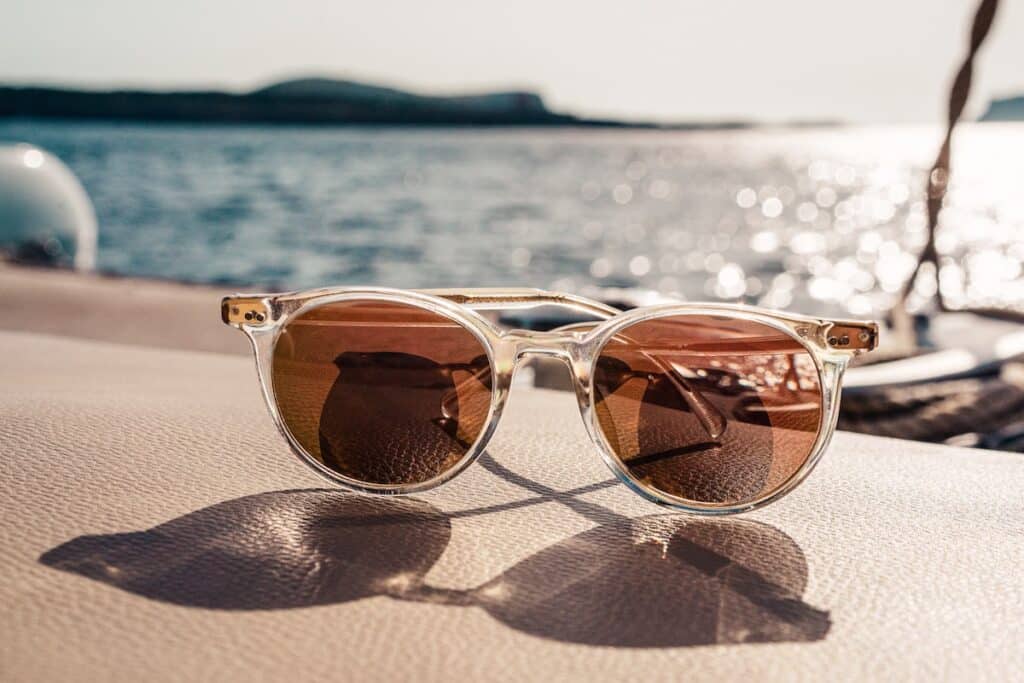Beyond their fashionable appeal, sunglasses serve a vital purpose. The right sunglasses can provide essential defense against the harmful ultraviolet (UV) radiation emitted by the sun, the very same UV light that can be detrimental to your skin. The reassuring fact is that you can marry style with safety when selecting your shades. However, it’s crucial to understand what to look for, as your current approach to eye protection can significantly impact your eye health in the future.
How UV Radiation Can Damage Your Eyes
Extended exposure to ultraviolet (UV) rays modifies lens proteins, resulting in the development of cataracts and the deterioration of visual acuity. Over time, cataracts can cause vision to become increasingly blurred, hazy, or less vibrant. Additionally, UV exposure has been associated with the incidence of eyelid cancers, such as basal cell carcinoma and squamous cell carcinoma.
Taking measures to protect your eyes from the harmful effects of UV rays can help you steer clear of various eye conditions, such as:
- Cataracts: This condition involves the clouding of the eye’s lens, resulting in blurry or colorless vision.
- Eye Cancers: These can include melanoma and lymphoma, which originate and proliferate within the eye.
- Eye Growths: Conditions like pterygium and pinguecula typically originate on the conjunctiva, the transparent tissue covering the whites of the eyes, and can eventually impact your eyesight.
- Photokeratitis: Often referred to as sunburned eyes, this painful condition affects the surface layer of the eyes (cornea) and the conjunctiva.
- Snow Blindness: A type of photokeratitis, snow blindness occurs when UV rays bounce off ice and snow, causing harm to the eyes.
UV Protection
The majority of trusted brands prominently display UV protection information on a visible sticker or tag. Seek out sunglasses that provide either 100% UV protection against all UV light types (UVA and UVB) or 100% protection against UV 400.
If you have doubts about the UV protection level of older sunglasses, you can assess it by visiting an optical store equipped with a UV light meter. This quick test, typically completed in under a minute, is often offered free of charge by most opticians.
Polarization
Polarized lenses tend to offer enhanced comfort to many individuals by reducing the glare caused by light bouncing off surfaces like water, snow, and roads. However, it’s important to note that polarization alone does not offer protection against UV light. There are polarized lenses available that also provide UV filtering capabilities, so it’s important to opt for those with the highest level of UV protection for eye safety.
Darker Sunglasses Doesn’t Equal Higher UV Protection
When searching for sunglasses, avoid the misconception that darker lenses equate to greater safety for your eyes. The only sunglasses that offer the required safety are those with 100% UV protection. For individuals dealing with chronic eye conditions like macular degeneration or diabetic retinopathy, it’s worth considering amber or brown-tinted lenses, as they can enhance vision. Nevertheless, it’s crucial to emphasize that UV protection remains the paramount feature to prioritize when shopping for sunglasses.
Best Sunglasses For Kids
Kids frequently engage in outdoor activities, and because their natural eye filters are still maturing, they are particularly susceptible to the harmful effects of sun exposure. Even children as young as 6 months can safely wear sunglasses. Just be sure to select a pair that offers both UV and impact protection. Frames designed with impact resistance are flexible and less prone to breaking, thus safeguarding your child’s eyes during falls and active play.
Sunglasses designed for children often feature headbands or integrated straps that secure them around the back of the head and neck, reducing the likelihood of them falling off or being misplaced. In addition to using sunglasses for eye protection, it is essential to schedule regular checkups to maintain optimal eye health.
Prescription Sunglasses
Consider transition or photochromic lenses if you require prescription eyeglasses. Prescription eyeglasses, especially those featuring polycarbonate lenses, already offer some inherent UV protection. Opting for lenses that naturally darken when exposed to outdoor light not only shields against UV rays but also reduces glare.
Here are the advantages of transition lenses:
- Cost Efficiency: Transition lenses eliminate the necessity for multiple pairs of glasses. Despite being slightly pricier than standard prescription lenses, they are considerably more economical than purchasing an entirely new pair of glasses.
- UV Shield: Transition lenses offer full 100% UV protection, whether they are in their tinted or clear state.
- Lens Options: Transition lenses are available in various lens shapes and styles, accommodating the requirements of nearly any prescription.
- Enhanced Coatings: Similar to regular lenses, transition lenses can be enhanced with additional protective coatings, such as anti-glare or blue light-blocking finishes.
Sunglasses should not be viewed as an optional summertime accessory; they are a vital prescription for maintaining eye health. Prolonged exposure to the sun without adequate protection can elevate the risk of developing eye diseases.

